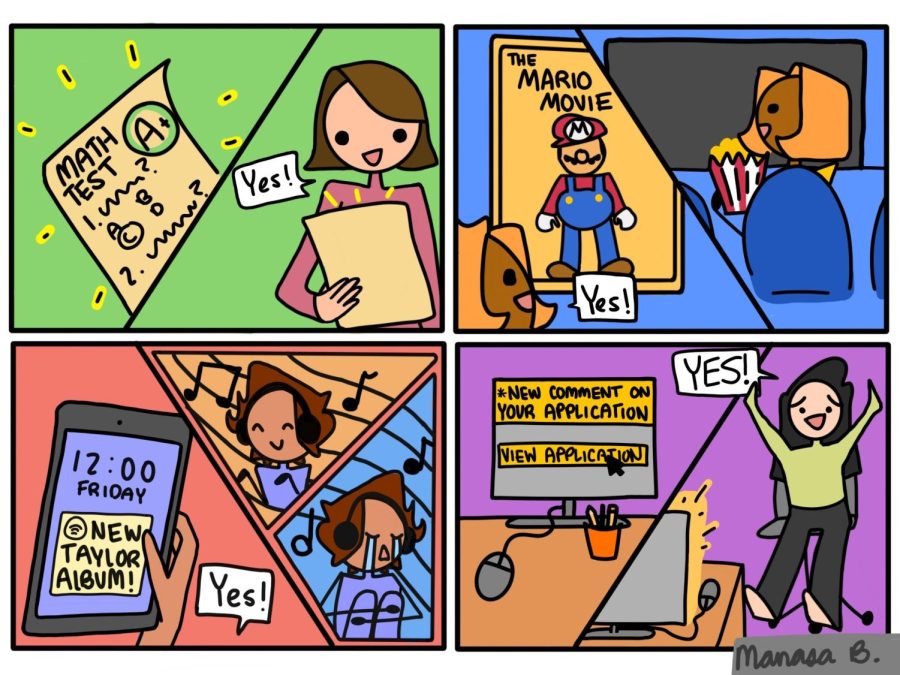Excitement is not a novelty
Everyday, little and big things happen that excite us, but we may sometimes feel like bottling that excitement up for fear of coming across as overdramatic. Student life editor Shrayes Gunna writes about how we should celebrate the things that make us happy or emotional, not hide them.
March 24, 2023
There it is again – that funny feeling.
The months dwindled into weeks that became days In anticipation of Gracie Abram’s latest project “Good Riddance.” It is all but hours away from being the next fixation my mind escapes to.
With worksheets and books strewn across my bedroom floor, I drop my backpack – heavy with the stress of the day.
Thud.
Furled in my beige comforter in the corner of my room, I plug my headphones in and stream.
My back slumps over as I take in the cut-and-dry lyricism, seemingly losing all structure. Despite the rain clouds making room for my eyes, I text to urge my friends to listen along.
Yes, I cried. In retrospect, it is a tad overdramatic. But… I was excited.
Excitement is not a novelty. It does not have to fade away with time, as though the feeling – so cherished as a child – is nothing but a faint memory.
In trying to diagnose the cause behind ever changing perceptions of excitement, I found myself stumped. Perhaps it is in our obsession with minimalism, that more than sleek countertops and greyscale walls, our emotions must also look bleak in order to fit into societal standards.
Minimalism, the antithesis of the commonly asserted phrase “doing too much,” is a largely growing trend born out of the world of interior design. Through its dissemination among a vast majority of Generation Z and Millenials, it has influenced the ways in which people not only decorate their bedrooms and kitchens, but also the ways in which they consume, interact with others and express themselves.
The mental health tracking app “Life Intelligence” highlights the trends’ positive influence on our choices, writing “…minimalists experience less stress and anxiety and more happiness and fulfillment…because they do not concern themselves with the minutiae of everyday life.”
It is in that very notion that I find contention: “minutiae.” Of course, not every moment is worth getting wound up in. A bad grade on a homework assignment or sleeping through a blaring alarm is not worth ruining your day, but it also does not have to mean the opposite. A good grade or a productive morning should be something you celebrate, something you are excited about.
At the point that we as humans – with a heart and emotions – sideline all the good as yet another “minutiae” is fundamentally harmful. You are not lousy, but your one seemingly circumstantial success is outstanding nonetheless.
It boils down to one simple thought: if you do not celebrate or get excited for yourself, no one else will. Excitement, despite popular culture painting it out to be dramatized, is infectious and natural. Whether excited for an up-and-coming film or a college acceptance, it is always OK to laugh, smile or cry.
Instead of being shy or shielding yourself from the dictums of TikTok comments and short-exchanges that resemble the far too common phrase—“doing too much”—ask yourself what “too much” really is. Because if it means putting a colorful quilt on your bed instead of a white comforter or going out to dinner to celebrate the award you spent months working toward, then you are not dramatic. You are not excessive. You are not “doing too much.”
In fact, I choose to block out that noise with the sound of an album that I am not ashamed to say I cried to during my first listen (and continue to do so).
Follow Shrayes (@ShrayesGunna) and @CHSCampusNews on Twitter











